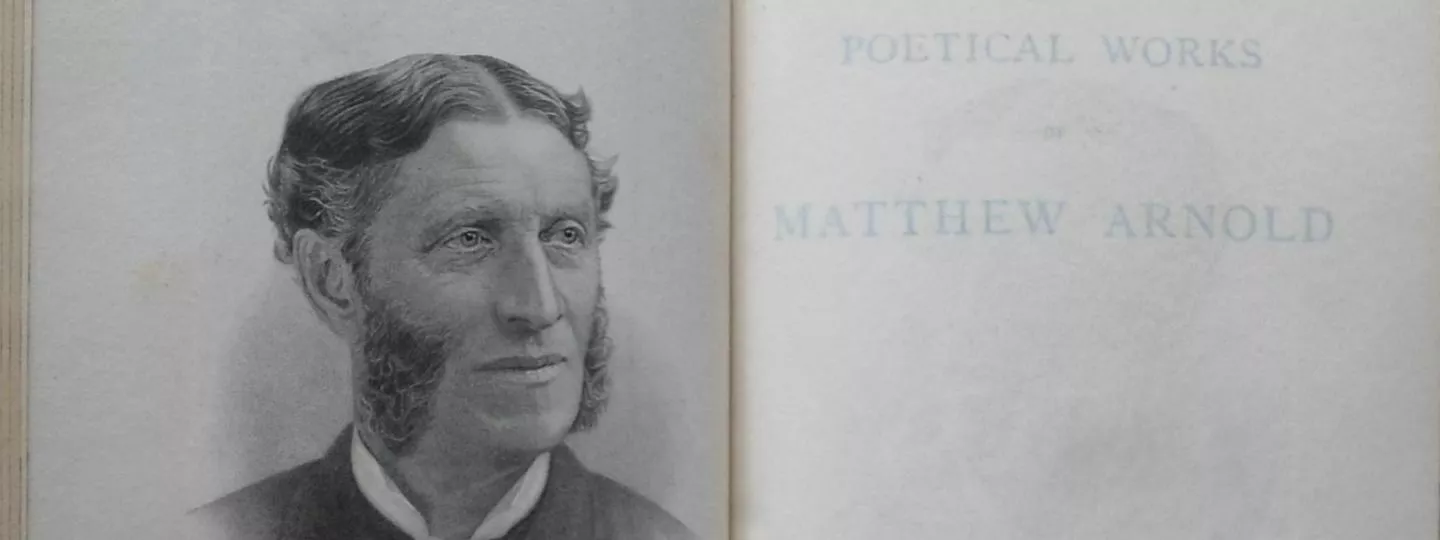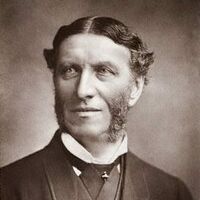
Matthew Arnold
Although remembered now for his elegantly argued critical essays, Matthew Arnold (1822-1888) began his career as a poet, winning early recognition as a student at the Rugby School where his father, Thomas Arnold, had earned national acclaim as a strict and innovative headmaster. Arnold also studied at Balliol College, Oxford University. In 1844, after completing his undergraduate degree at Oxford, he returned to Rugby as a teacher of classics. After marrying in 1851, Arnold began work as a government school inspector, a grueling position which nonetheless afforded him the opportunity to travel throughout England and the Continent. Throughout his thirty-five years in this position Arnold developed an interest in education, an interest which fed into both his critical works and his poetry. Empedocles on Etna (1852) and Poems (1853) established Arnold's reputation as a poet and in 1857 he was offered a position, which he accepted and held until 1867, as Professor of Poetry at Oxford. Arnold became the first professor to lecture in English rather than Latin. During this time Arnold wrote the bulk of his most famous critical works, Essays in Criticism (1865) and Culture and Anarchy (1869), in which he sets forth ideas that greatly reflect the predominant values of the Victorian era.
Although remembered now for his elegantly argued critical essays, Matthew Arnold (1822-1888) began his career as a poet, winning early recognition as a student at the Rugby School where his father, Thomas Arnold, had earned national acclaim as a strict and innovative headmaster. Arnold also studied at Balliol College, Oxford University. In 1844, after completing his undergraduate degree at Oxford, he returned to Rugby as a teacher of classics. After marrying in 1851, Arnold began work as a government school inspector, a grueling position which nonetheless afforded him the opportunity to travel throughout England and the Continent. Throughout his thirty-five years in this position Arnold developed an interest in education, an interest which fed into both his critical works and his poetry. Empedocles on Etna (1852) and Poems (1853) established Arnold's reputation as a poet and in 1857 he was offered a position, which he accepted and held until 1867, as Professor of Poetry at Oxford. Arnold became the first professor to lecture in English rather than Latin. During this time Arnold wrote the bulk of his most famous critical works, Essays in Criticism (1865) and Culture and Anarchy (1869), in which he sets forth ideas that greatly reflect the predominant values of the Victorian era.
Meditative and rhetorical, Arnold's poetry often wrestles with problems of psychological isolation. In "To Marguerite—Continued," for example, Arnold revises Donne's assertion that "No man is an island," suggesting that we "mortals" are indeed "in the sea of life enisled." Other well-known poems, such as "Dover Beach," link the problem of isolation with what Arnold saw as the dwindling faith of his time. Despite his own religious doubts, a source of great anxiety for him, in several essays Arnold sought to establish the essential truth of Christianity. His most influential essays, however, were those on literary topics. In "The Function of Criticism" (1865) and "The Study of Poetry" (1880) Arnold called for a new epic poetry: a poetry that would address the moral needs of his readers, "to animate and ennoble them." Arnold's arguments, for a renewed religious faith and an adoption of classical aesthetics and morals, are particularly representative of mainstream Victorian intellectual concerns. His approach—his gentlemanly and subtle style—to these issues, however, established criticism as an art form, and has influenced almost every major English critic since, including T. S. Eliot, Lionel Trilling, and Harold Bloom. Though perhaps less obvious, the tremendous influence of his poetry, which addresses the poet's most innermost feelings with complete transparency, can easily be seen in writers as different from each other as W. B. Yeats, James Wright, Sylvia Plath, and Sharon Olds. Late in life, in 1883 and 1886, Arnold made two lecturing tours of the United States. Matthew Arnold died in Liverpool in 1888.
A Selected Bibliography
Poetry
A Matthew Arnold Birthday Book (1883)
Alaric at Rome: A Prize Poem (1840)
Cromwell: A Prize Poem (1843)
Empedocles on Etna and Other Poems (1852)
Empedocles on Etna: A Dramatic Poem (1900)
Merope: A Tragedy (1858)
New Poems (1867)
Poems: A New Edition (1853)
Poems: Second Series (1855)
The Poems of Matthew Arnold (1965)
The Poetical Works of Matthew Arnold (1950)
The Strayed Reveller and Other Poems (1849)
The Works of Matthew Arnold (1903)
Prose
Essays, Letters, and Reviews by Matthew Arnold Essays, Letters, and Reviews by Matthew Arnold (1960)
Friendship's Garland (1883)
"Charles Augustin Sainte-Beuve," in Encyclopedia Britannica, ninth edition, IX: 162-165 (1886)
"Isaiah of Jerusalem" in the Authorized English Version, with an Introduction, Corrections and Notes (1883)
"Schools," in The Reign of Queen Victoria (1887)
A Bible-Reading for Schools: The Great Prophecy of Israel's Restoration (1872)
A French Eton; or, Middle Class Education and the State (1864)
Arnold as Dramatic Critic (1903)
Civilization in the United States: First and Last Impressions of America (1888)
Complete Prose Works (1960)
Culture and Anarchy (1883)
Culture and Anarchy: An Essay in Political and Social Criticism (1869)
Culture and the State (1965)
Discourses in America (1885)
Education Department (1886)
England and the Italian Question (1859)
England and the Italian Question, (1953)
Essays in Criticism (1865)
Essays in Criticism: Second Series (1888)
Essays in Criticism: Third Series (1910)
Five Uncollected Essays of Matthew Arnold (1953)
General Grant, with a Rejoinder by Mark Twain (1966)
General Grant: An Estimate (1887)
God and the Bible: A Review of Objections to "Literature and Dogma" (1875)
Heinrich Heine (1863)
Higher Schools and Universities in Germany (1874)
Irish Essays, and Others (1882)
Isaiah XLLXVI; with the Shorter Prophecies Allied to It (1875)
Last Essays on Church and Religion (1877)
Letters of Matthew Arnold, 1848-1888 (1895)
Letters of an Old Playgoer (1919)
Letters, Speeches and Tracts on Irish Affairs by Edmund Burke (1881)
Literature and Dogma: An Essay towards a Better Apprehension of the Bible (1873)
Matthew Arnold's Letters: A Descriptive Checklist (1968)
Matthew Arnold's Notebooks (1902)
Mixed Essays (1879)
On Home Rule for Ireland: Two Letters to "The Times" (1891)
On Translating Homer: Last Words: A Lecture Given at Oxford (1862)
On Translating Homer: Three Lectures Given at Oxford (1861)
On the Modern Element in Literature (1869)
On the Study of Celtic Literature (1883)
Poems of Wordsworth (1879)
Poetry of Byron (1881)
Reports on Elementary Schools 1852-1882 (1889)
Schools and Universities on the Continent (1867)
St. Paul and Protestantism; with an Introduction on Puritanism and the Church of England (1883)
The Hundred Greatest Men: Portraits of the One Hundred Greatest Men of History (1879)
The Letters of Matthew Arnold to Arthur Hugh Clough (1932)
The Note-Books of Matthew Arnold (1952)
The Popular Education of France, with Notices of That of Holland and Switzerland (1861)
The Six Chief Lives from Johnson's "Lives of the Poets," with Macaulay's "Life of Johnson," (1878)
The Study of Poetry (1880)
Thoughts on Education Chosen From the Writings of Matthew Arnold (1912)
Unpublished Letters of Matthew Arnold (1923)
References
Poets.org - www.poets.org/poet.php/prmPID/88
#EnglishWriters Victorian


